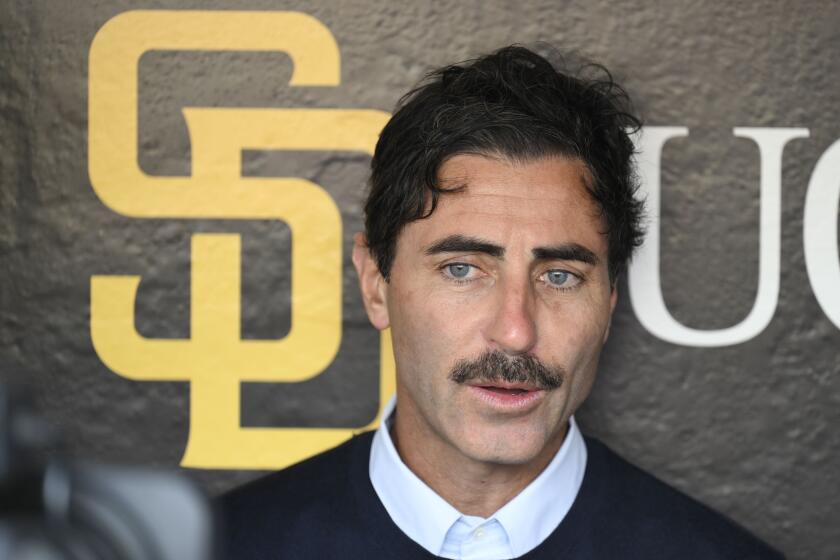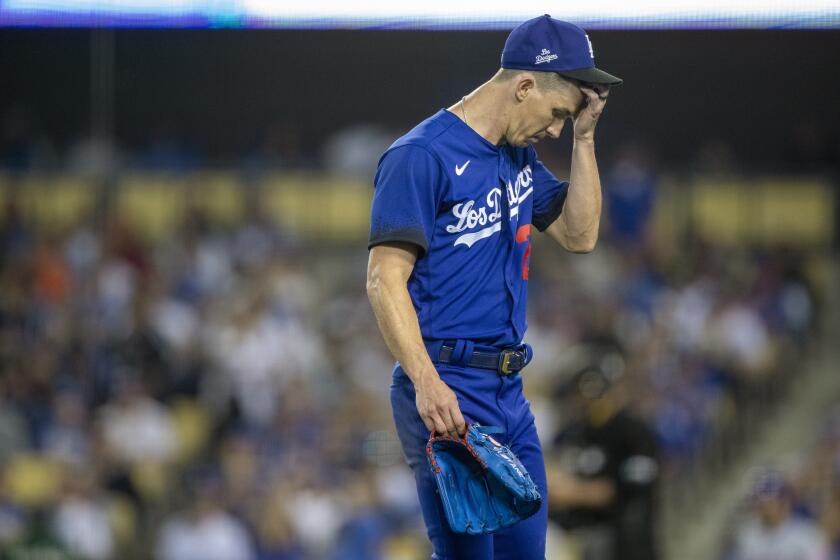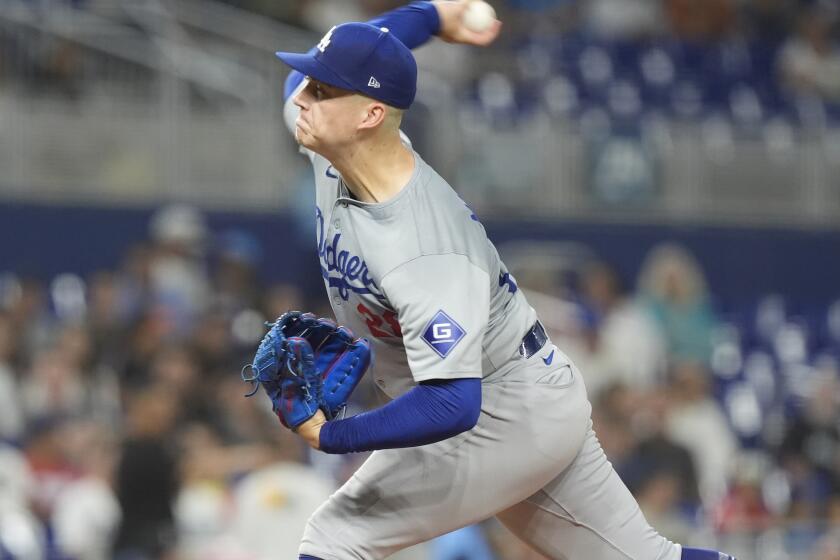So That’s Why Evans Didn’t Give Away Farm
Does Edwin Jackson deserve more than a “W” in the box score for those six impressive innings in his major league debut?
Did he do more than quiet the Arizona Diamondbacks, coming up big on his 20th birthday amid playoff-race pressure only 27 months after being drafted by the Dodgers as a pitcher and outfielder?
Can he also be credited with silencing critics (better left nameless) of General Manager Dan Evans for his failure to pay any price in pursuit of big-name hitting help?
Well, it would be foolish to suggest that six innings represent a career, but what Jackson did was provide snapshots of the type of talent and composure that is difficult to trade in any environment under any circumstances.
Of course, Evans will be hammered again if the Dodgers fail to reach the playoffs because of their inept offense.
It will be chronicled again how the decisions of previous regimes, the use of the luxury tax threshold as a payroll cap and the refusal to trade any of his touted young pitchers helped extend the club’s playoff drought.
At the least, however, Jackson provided an attractive glimpse at what the future beyond 2003 might look like -- and how often in recent years has the neglected farm system been able to provide an alternative to a future otherwise linked to aging arms and outrageous and immovable contracts?
Did Evans feel justified?
Did he read into Jackson’s performance a reply to the critics?
“Well,” Evans said, “the criticism comes with the territory and I’m all right with that.
“I mean, it would have been easy to go for the quick fix and move a kid like this, but what we’re trying to do takes time.
“We have to reach a point where we can replace players from within, put a focus on pitching and defense and be a contender every year.
“As for the way this kid pitched last night ... well, I don’t want to throw everything on one game, but Dodger fans should be happy I never considered trading him.
“He can have an impact for a long time. I told him in May when I saw him in Birmingham that he wouldn’t be making his major league debut for anyone except the Dodgers.”
It has been a fast ride.
Jackson went from the rookie level in his first pro season of 2001 to low A in 2002 and to double-A Jacksonville this year. He skipped high A and still hasn’t pitched in triple A, which he may never do.
The scouting director under whom Jackson was selected in the sixth round of the ’01 June draft out of Shaw High in Columbus, Ga., was Ed Creech, who was hired by Kevin Malone and stayed on during the summer in which Dave Wallace served as interim GM after Malone’s firing. Creech now heads the scouting department of the Pittsburgh Pirates and said from his Georgia home on Wednesday, “If we knew he was going to be this good we’d have drafted him higher.”
Creech credits Lon Joyce, the Dodger area scout, and Jimmy Lester, who was his national cross-checker then and is now his assistant in Pittsburgh, for the teamwork pursuit of Jackson and his family.
Lester lives a block from Shaw, where his wife, Beth, was Jackson’s freshman gym teacher. As a senior, Jackson was Georgia player of the year. He hit 14 home runs as a center fielder but was only the No. 2 pitcher on the Shaw team.
“I think the idea was to give him some at-bats in his first year [of pro ball] and see which came fastest, but in the long run I always felt his future would be as a pitcher,” Lester said.
Creech laughed and said he wasn’t sure about that.
“I have no doubt he could have made it as a power hitter,” Creech said. “I liked everything about him as a hitter, but he also had a live arm, and by the time the Dodgers took him to the instructional league [after his first year] it was obvious his arm was too good not to convert full time.”
Jackson was born in Germany, the son of a military man whose discipline, the Dodgers believe, has a lot to do with Jackson’s makeup on the mound. As a pitcher, however, he may be a product of several influences.
Instructors Joe Vavra, Mark Brewer and Rick Honeycutt were influential in that instructional camp where Jackson put his bat away for good.
Roger McDowell, who drove to Arizona from Palm Springs to see his big league debut, Kenny Howell and Jacksonville pitching coach Marty Reed, who was also in Arizona, contributed to his mound maturation.
“He really wasn’t on our radar at the start of this season, but by May I was getting calls from Roger and Marty raving about him and some of our other young pitchers,” Evans said. “I mean, when you ask me about the way he pitched [Tuesday night], the people I’m happiest for is our player development staff. He’s a kid who listens, asks the right questions.
“We were putting a lot on his shoulders, jumping the gun with him, but everyone in the group thought he had the makeup and ability to do it, and I give a lot of credit to [Manager] Jim Tracy. He didn’t flinch. He said if everyone agrees that this is the guy, I’m with it.”
If Hideo Nomo takes his turn Sunday, Jackson may not pitch again this season, but his debut seemed to illustrate why his name, along with those of fellow pitching prospects Greg Miller and Joel Hanrahan, was brought up frequently by other clubs in trade talks.
Creech, the former Dodger scouting director now with the Pirates, acknowledged that General Manager Dave Littlefield asked his opinion on the three when the Dodgers were trying to acquire outfielder Brian Giles.
“You can’t blame Dave for wanting those guys,” Creech said without being specific as to which or how many of the three the Pirates demanded.
“They’re terrific prospects. The Dodgers have done a great job of development.”
It’s a job too long sacrificed by the Dodgers, who at some point had to pause, step back and give their system time to revive.
There are those, of course, who will maintain that the club’s 2003 financial investment demanded that some of that future be sacrificed to obtain a hitter.
Considering the way Edwin Jackson pitched in his debut, however, maybe the criticism is backward.
Maybe the beleaguered Evans should be asked: Why wasn’t he up sooner?
More to Read
Are you a true-blue fan?
Get our Dodgers Dugout newsletter for insights, news and much more.
You may occasionally receive promotional content from the Los Angeles Times.










